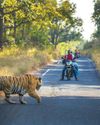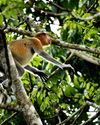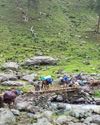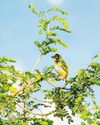The human-elephant conflict is an ongoing one. But this in-depth account, drawn from the author’s decades of experience with elephants in habitats across the country, reveals the multiplicity of avoidable reasons it stems from.
THE BEGINNING
The tusker was drinking water standing on the right bank of Sigur stream downstream of Vazhaithottam near Cheetal Walk in Nilgiri North Forest Division. It was midday during an early month of 1975. The wind was still in the valley and I noticed the bull as I walked wearing flip-flops along the left bank of the stream. At that time, there was a dense growth of tall Bambusa arundinacea all along the stream bank and this provided enough cover for me to move along the bank unseen by the tusker. As part of my salary to work on the dhole project (which I was doing with Dr. Michael Fox of USA) I was given a camera and had started taking pictures of interesting things in the jungle.
That day my camera had been loaded with a 400 ASA BW film and I was wearing a field outfit, which merged well with the surroundings. The streambed was about 15m wide and was full of large and small rocks. Hoping that the rocks would slow down the bull’s rapid charge (if he so deigned), I moved out of the bamboo to get a clear picture. Elephants, particularly adults, are noted for their inability to see clearly at a distance. But this bull noticed me, stopped drinking and with an astonishing speed ran over the rocks towards me. I dropped the flip-flops where I was standing and ran like a deer pursued by dholes to the safety of Cheetal Walk, which was about 200m away. While running, I looked behind and saw the bull standing near the spot where I had left my footwear. Possibly they distracted it and hours later I quietly went back to collect my flip-flops which were lying exactly where I had left them. This was surprising as elephants sometimes play with or carry away objects left by humans.
This story is from the June - August 2017 edition of Saevus.
Start your 7-day Magzter GOLD free trial to access thousands of curated premium stories, and 9,000+ magazines and newspapers.
Already a subscriber ? Sign In
This story is from the June - August 2017 edition of Saevus.
Start your 7-day Magzter GOLD free trial to access thousands of curated premium stories, and 9,000+ magazines and newspapers.
Already a subscriber? Sign In

Staying ALIVE!
The importance of getting to the root causes of conflict with wildlife, is essential. Its mitigation will guarantee the very survival of all species.

Frames from the WILD
A few amazing shots from a horde of incredible ones!

WAKE UP!
A frightening thought a world without wildlife, mornings without birdsong, and all that we take for granted! We must realise the dangers threatening the beauteous green world and its inhabitants around us!

Dolphin DILEMMA!
A crucial article to highlight the significance, and plight of Our riverine friends.

Gecko Quest!
The authors take us on the trail of a gecko from West Bengal, through the hills of the Bankura district.

Endangered EXOTICA!
The author takes us on an exotic ride into the forests of Malaysia, allowing us glimpses of the beauties of its wildlife!

Mellifluous Magpie!
Immerse yourselves in the world of the musical and glorious Magpie Robin! The authors help acquaint us with this beautiful bird.

Think Different!
The author brings to us the very real concern for the horses employed around pilgrimage sites in India.

Take Heed!
The authors make a case for the conservation of the rare and lesser-known Sociable Lapwing.

Close Encounters!
The author introduces us to two amazing yet very different bird species, showing us the diversity of our ecosystems,